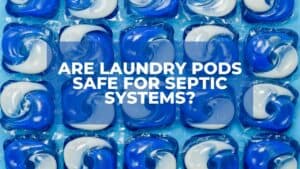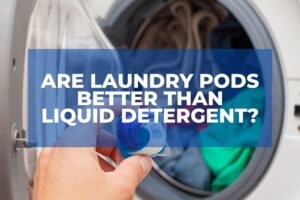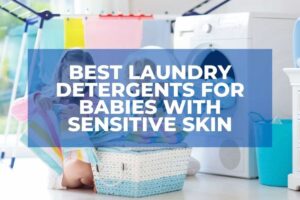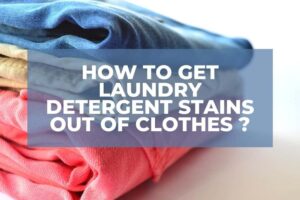If you’re living in a house connected to a septic system, it’s time you learned (or reminded yourself) that it pays to watch what goes down your drains.
Wastes in the septic system often rely on a delicate balance of microorganisms for their complete breakdown. Adding harmful chemicals to the system means harming such microorganisms; hence, interrupting their normal functioning.

Chemicals that run down the septic can come from a plethora of sources in a household. But today, we choose to talk about laundry detergent pods.
Are laundry pods safe for septic systems?
Yes. Most non-toxic laundry pods are safe for septic systems but that depends on an ample mix of factors. Learn about such factors in this article.
Quick Navigation
What Is A ‘Septic-Safe’ Laundry Pod?
While there’s no official definition for this term, there is a threshold of requirements needed to consider something to be septic-safe. As already mentioned, your septic system is sensitive to chemicals that can cause an imbalance of microorganisms.
Likewise, its drainage system needs to steer clear of substances that may clog it. It would also be better if whatever goes into your septic system is biodegradable.
Biodegradable substances provide food for the good bacteria and enzymes helping in the breakdown of wastes. If you’re using detergent pods with the characteristics above, that’s what we call a septic-safe detergent pod.
Plus, if your septic system is aerated, your detergent pods should be the type that doesn’t produce many suds. Many suds are not good for the system’s bacteria and general efficiency.
Top 4 ‘Septic-Safe’ Laundry Pods
How Septic-Unsafe Laundry Detergent Pods Harm Your Septic System
You need to learn why using septic-unsafe detergent pods isn’t a good idea so that you can keep them at bay all the time. Well, here are a few popular points to keep in mind:
- They may contain elements that don’t fully break down; hence, causing clogs on your drainage pipes. You end up looking for professional assistance to unclog the pipes.
- If you have an aerated septic tank, it’s advisable to use laundry detergent pods that do not produce many suds. Suds cause clogging by slowing down hydrolysis.
- The high levels of surfactants in septic-unsafe pods make them toxic in water. Such water kills good bacteria and enzymes in the sewage.
- Some laundry pods aren’t biodegradable, which means they do not add nutritional value to the good microorganisms in your septic system.
Apart from these, there is even more harm caused by pods that aren’t safe for septic tanks depending on their ingredients. Meanwhile, you can avoid them by looking for the ‘septic-safe mark/writing on the detergent’s label.
Please don’t make judgments from advertisements alone. Most companies don’t often disclose all harm caused by their products.
How Do I Solve The Mess Caused By Harmful Laundry Detergent Pods?
Not everyone knows about septic-safe detergent. You might be learning about it today. Well, if you’ve been using detergent pods indiscriminately, and you’re asking yourself how to reverse the mess, you’re not alone.
What’s better, there’s a way out. Here are some hacks that shall help you make positive contributions to the levels of good microorganisms in your septic system.
- Of course, the first step is to avoid using the harmful types of pods that you’ve been using before.
- If you have access to a septic system professional, you can consult with them about the products they recommend as suitable for use around the system. Most of them have a ready list of recommended detergent products.
- If you opt for the use of septic treatment products, we urge you to choose those that add good bacteria to the system. They’re always labeled appropriately. Ensure that you use one that suits the type of septic system around you.
- If you are based in the United States, always reference EPA’s list of septic-safe pods before spending a coin on any of them.
Please remember to use antibacterial detergent in the smallest amounts ever. Also, avoid ammonia-loaded and chlorine-filled detergent.
Using Pods (And Washing Machines) Correctly to Protect your Septic System
Avoid Using Excess Pods:
Laundry detergent pods have recommended amounts that should be used with specified loads. The recommended amount of pods will dissolve in water without releasing excess cleaning chemicals that can affect the balance of microorganisms in the septic system.
But if used in excess, they will expose the good bacteria to lethal levels of surfactants, phosphates, and other harmful chemicals.
Don’t Overload The Septic System:
Before you do many rounds of laundry, ensure that your septic tank has sufficient capacity for the water that shall be released into it. Laundry machines use a lot of water. If you do so many rounds of laundry, you could be overwhelming the system.
And when you do so, it means that waste will be released into the drain field before it is adequately processed. Such can cause serious problems that call for experts’ intervention.
Use Antibacterial Detergent Pods In The Smallest Amounts:
You may want to use antibacterial pods to eradicate bacteria in your house. The antibacterial detergent will obviously kill bacteria — good or bad. But, using them intermittently and in small amounts doesn’t really pose a danger to the microorganisms needed for sewage processing.
Therefore, for the safety of the septic system, consider using them in small amounts.
Opt For DIY Detergent
DIY detergents are the best alternatives in case you can’t find septic-safe detergent pods or feel that they’re too expensive. They usually contain biodegradable elements, form fewer suds, and are less harmful to the skin and body in general.
There are many recipes and ingredients for making them but you got to stick with the ones that do the least (or no) harm to your septic system.
The Bottom Line
Most detergent pods are safe for septic systems but you still need to confirm that the one you’re about to purchase is labeled safe. Meanwhile, you must also use them safely to ensure that you’re on the right track. A septic system specialist can help you find the right pods and products to always use.


